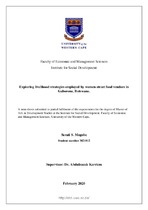| dc.description.abstract | The informal economy has continued to increase in developing countries, giving jobs and income to marginalised groups, the majority being women. The rise of the informal sector is perpetuated by exclusionary social policies and the continued increase in unemployment. In Botswana, street food vending, the most visible form of the informal sector trading, has evolved to be a survivalist activity that women populate. Increasing poverty levels, gender inequalities, and high unemployment rates have resulted in poor urban women being vulnerable to the stresses and shocks caused by these factors. Street food vending is therefore pursued by women to mitigate their vulnerability. Additionally, street food vending allows for more flexible working hours, thus accommodating women’s community, household, and productive roles. Despite women’s substantial contribution to Botswana’s informal economy, the government has not done much to support them. | en_US |

